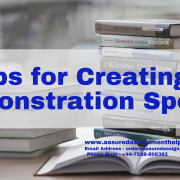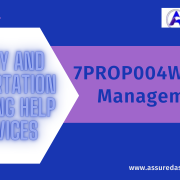Executive Summary
The study sheds light on critical reflection of leadership for defining personal development. Component A and Component B are discussed in this study. Learning and understanding of leadership approaches are detailed briefly. The study helps in understanding the significance of leadership skills in order to achieve business goals. The study has future suggestions which have also been provided for the better understanding of the leadership characters. Finally, a leader interview has been developed with key conclusions of this study.
Component A
Introduction
Self-reflection is the best possible way for the evaluation of one’s own learning. Therefore, it will also help to identify the skill gaps or required improvements that are essential to improve one’s own competency level. This study is based on my self-reflection of learning. Critical reflection on my leadership and personality development has been illustrated in this study. A personal development plan has also been prepared and detailed in this section. This study also evaluates my learning as per the Kolb’s learning Cycle. It will make my learning review more prominent that can deliver clear insight about my current competency level related to leadership.
Development of leadership skills is one of the most crucial criteria for maintaining competency in the workplace. As per the views of Hansen and Bathurst (2011), development of leadership skills also enhances the decision-making potential that might be also helpful for individuals personal as well as professional life. The current courses enhance my knowledge of leadership and its different attributes greatly. However, when I evaluate my leadership capability in context of the leadership principles and effective leadership theories, I have found that I am associated with several skill gaps which reduce the efficiency of my leadership. In addition to that, through the self-assessment I have also identified that I need to polish up some of my skills otherwise they might be potential constraints towards my leadership activities. Focusing on personal development might be also useful for me to become a potential leader in the future which might result in professional betterment.
Personal Development Plan (PDP)
| Planned area of development | Identification of the development | Priority of the development | Planned actions | Ways of measuring improvements | Timeline |
| Enhancement of communication skills | I have interaction issues numerous times during the interaction with unknown individuals. It restricts my potential for leadership. In addition to that I have encountered stammer issues. | High | Practicing interaction with friends and family
Participating in speeches, seminars Interactive sessions |
Studying the communication frequency and approach of communication
Identifying if there is any problem during communication |
2 months |
| Improvement of time-management capability | I often miss deadlines in long work because I consumes more time at initial phase to make the task perfect | Moderate | I planned to schedule my task and will set my own deadline which will be definitely earlier than the actual. Moreover, I will also practice multitasking to save additional time. | Monitoring my task completion time and checking the progress as per the deadlines is the best option to ensure the progress in enhancement of time-management skill. | 1 month |
| Working on the convincing ability | I am unable to convince individuals to do some good things. I am also unable to convince my friends and family members in numerous cases. | High | I planned to work on my critical thinking ability by reading books of several leaders.
I will also prioritise my technical skill development to ensure I am able to convince others with technical facts. |
Monitoring the convincing rate is the best possible option to track the improvement in the convincing capabilities. | 1 month |
Table 1: PDP
Source: (Created by author)
Analysis
Self-evaluation helps me to identify that I feel a lack of confidence during the interaction with individuals. As a result of which I am unable to demonstrate them properly. Hence, it can be considered a potential weakness of myself. In many cases I stammered. This aspect signifies my need to work on the interaction and communication capability. As mentioned by Ladkin (2008), effective time management is essential for the leaders to deliver optimum performance continuously which can inspire others. Therefore, working on the improvement of time management becomes crucial for me. I have found that I am unable to complete the task in a given time. It might affect leadership significantly. So, I have planned to prioritise and schedule my tasks properly and will practice multitasking. During the course I have encountered that I need to make improvements in my convincing ability. As mentioned by Larsson and Lundholm (2013), convincing capability is essential for the ladders to influence the workforce properly. Therefore, lack of this skill might cause a potential barrier to my leadership capabilities.
Review of learning by leadership approach implementing models and theories
Review of learning is essential to ensure whether the learning is complete and effective or not. Therefore, a proper theoretical framework or model must be utilised for the evaluation purpose of learning. “Kolb’s Learning Cycle” is one of the most effective as well as widely used theatrical frameworks that is used for the evaluation of learning. As per the knowledge of McLeod (2017), “development of concrete experience, execution of reflective observation, abstract conceptualisation and performing active experimentation” are the basic fundamentals of “Kolb’s Learning Cycle”.
Figure 1: “Kolb’s Learning Cycle”
Source: (As influenced by McLeod, 2017)
Self-reflection using Kolb’s learning Cycle
Development of concrete experience
The learning facilities must be able to develop concrete experience about the learning. In concrete experience a new experience is acquired during an encounter of a new situation. In the following course all the learning units highlight and demonstrate different attributes of leadership. The leadership aspects include basics of leadership, evaluation of leadership and management, concept of distributed leadership, approaches of followership and relational leadership, leadership power, ethical and toxic leadership, culture and leadership, leadership development as per the context of workplace etc. As mentioned by Schedlitzki et al. (2017), ideas about the different attributes of leadership and application of different leadership principles & theories makes a leader complete and more effective. Development of concrete experience helps the ladders to avoid operational error that can ensure better effectiveness of their roles and responsibilities. Thus, this course fulfils the criteria of concrete experience development greatly.
Execution of reflective observation
Reflective observation is another key criterion of evaluating the learning facilities. According to WIDIASTUTI and BUDIYANTO (2018), reflective observation basically helps to identify the gaps from the learnings that can deliver insight about the future working areas. Moreover, reflective observation might e also help to codify the experience of new learning that is useful for new skill development. The course covers leadership development in unit 10 which also covers different aesthetics of effective leadership. It addresses the requirements for reflective observation. However, the unit must be covered at the initial stages of the course for its better effectiveness. Therefore, in this section the learning cannot be marked as proficient though the learning facility covered leadership development aspects as per the workplace requirements. Moreover, the stages elaborated in the leadership development section are quite complicated and unorganised that also makes it challenging for learning through observation. Therefore, this can be considered as the negative side of the learning.
Abstract conceptualisation
Abstract conceptualisation is based on the development of new concepts or modification of the existing concepts. In this course basics of leadership, evaluation of leadership and management, concept of distributed leadership, approaches of followership and relational leadership, leadership power, ethical and toxic leadership, culture and leadership, leadership development as per the context of workplace are elaborated in detail through different units. It helps to develop adequate knowledge on different leadership contexts as well as enables individuals to form new concepts. In addition to that, the leadership units also deliver accessibility of a wide range of literatures which can help individuals to modify existing leadership concepts at their respective workplace. Thus, the learning facility achieves the abstract conceptualisation criteria of “Kolb’s Learning Cycle”
Performing active experimentation
Enabling learners or active experimentation basically ensures effectiveness and quality of the learning facilities. As mentioned by Chiu (2019), active experimentation is the phase in which a learner applies his or her knowledge into the practices which are gathered from learning.
The learning facilities can help me to apply my knowledge on basics of leadership, evaluation of leadership and management, concept of distributed leadership, approaches of followership and relational leadership, leadership power, ethical and toxic leadership, culture and leadership, leadership development as per the context of the workplace. Therefore, my learning from the course matches the active experimentation criteria. It might be also helpful for improving my certain skill set through proper experimentation that will improve the effectiveness of my leadership ability further.
Suggestions for future development
- For future development purposes, a leader needs to develop the skills in order to enhance the performance as well as for self-development purposes. Developing effective planning as well as strategies helps in personal growth which further helps in bringing out innovative ideas in order to achieve the business goals. Moreover, the role of leadership plays a vital role contributing to the growth of an organization.
- Furthermore, effective communication builds the trust between the employees and the leaders. This also helps in motivating as well as encouraging the employees to work efficiently in an organization. Not only this, leadership skills help in reducing the chances of misunderstanding between the employees and the leader which can result in increased productivity. This further helps in getting the profitable results for the company in order to achieve success. Moreover, effective communication helps in enhancing the leadership skills and helps the leader to understand the needs as well as requirements of the employees and makes the leaders empathetic to analyse the situation properly.
Conclusion
It can be concluded that leadership skills play an important role in an organization in order to achieve business targeted roles for future growth. Leadership skills further help in creating more opportunities for the organization with the help of self-development progress as well as personal growth of a leader working in an organization. Moreover, the assignment highlights the significant role of a leader as well as the challenges under which a leader has been gone through over the course of time. The assignment further focuses on the critical reflection into leadership and development. The assignment further emphasises over the reviews of learning based on the leadership approach implementing models and theories using Kolb’s learning cycle. The assignment also highlights the suggestions for the future development purposes in order to enhance the performance so as to increase productivity.
Component B – Leader interview
| Q1: According to you what is effective leadership? | |
| David Root (Leader) | According to me leadership is basically an individual’s ability to influence and guide others or a group of people. As mentioned by Yukl (2006), leadership can be also defined as the art of motivating individuals that is essential to gain best output from them through maximum involvement. I also agree with this so I feel that effective leadership must include the attribute of motivating people to the best possible extent in order to achieve the desired output. I also feel that an effective leadership approach must cover a suitable guiding process as it is essential to entire the individuals at the best possible level. |
| Q2: What are the principles leaders must follow? | |
| David Root (Leader) | Leaders must be concerned about integrity, honesty, clear focus, humility to ensure development of positive perception among the individuals. It is one of the key criteria to positively influence people. Schyns and Schilling (2011), commented that motivation, innovation, delegation, shared vision, initiating positive change in the organisation, effective strategic alignment is some of the key principles of leadership. I believe the same therefore, the leaders must follow this principle to ensure betterment of their leadership performance. I personally feel that transparency is another key principle that the leaders must follow for improving their leadership acceptance. |
| Q3: Can you shed light on some effective leadership theories? | |
| David Root (Leader) | From my experience as a leader and knowledge on leadership I can clearly say that following leadership theories makes it easier to perform leadership roles and responsibilities. Situational leadership, Contingency leadership, Transformational leadership are some of the leadership theories that are mostly used. As per situational leadership different leadership style has been adopted by the leaders as per the situational demand (Gill, 2006). Contingency leadership is based on the linking between leaders, followers and situations in which suitable practices are considered by balancing all the aspects. Bass & Riggio (2006), mentioned that Transformational leadership is based on achievement of performance beyond the normal level by changing people’s own perception. It facilitates future leader development through continuous motivation. |
| Q4: Do you believe management and leadership are similar? | |
| David Root (Leader) | I believe that management and leadership are very much different from each other. Management is based on optimising different aspects for performance betterment whereas the leadership is based on motivating and guiding individuals which improves involvement to extract best possible output from the individuals. As stated by Grint (2008), leaders are asking for individuals who follow them and managers are looking for individuals who will work for them. However, it is also possible that leadership and management coexist efficiently though the chances are quite low. |
| Q5: What are your recommendations for future leaders? | |
| David Root (Leader) | I often noticed that future leaders lack leadership skill, attitudes and behaviour. Therefore, at the very first stage my recommendation will be performing self-assessment to identify the skill gaps. It will help to address the gaps properly which might be useful to play the leadership role. In addition to that, I recommend young leaders to emphasise more on relationship development. It is basically the key criteria to influence the individuals to the best possible level. |
References
Chiu, S.K., (2019). Innovative experiential learning experience: Pedagogical adopting Kolb’s learning cycle at higher education in Hong Kong. Cogent Education, 6(1), p.1644720.
Gill, R. (2006). Theory and Practice of Leadership. Sage.
Grint, K. (2008) Leadership, Management and Command: Re-thinking D-Day. Basingstoke: Palgrave.
Ladkin, D. (2008) Leading beautifully: how mastery, congruence and purpose create the aesthetic of embodied leadership practice. The Leadership Quarterly, 19(1): 31–41.
McLeod, S., (2017). Kolb’s learning styles and experiential learning cycle. Simply psychology.
Schedlitzki, D., Edwards, G. and While, G., (2017b). Leadership, management and the Welsh language. European Management Review, 14(1), pp.19-31.
Schyns, B. and Schilling, J. (2011), Implicit Leadership Theories: Think Leader, Think Effective? Journal of Management Inquiry, 20(2): 141-150.
Yukl, G. (2006). Leadership in Organizations. Pearson.
Appendix
Unit 1
Experience
Unit 1 of this course delivers very clear insight about the basic attributes of leadership which might be helpful to deliver experience about the identification of potential leaders.
Feelings
I have felt that leadership is one of the most essential characteristics that individuals must have to gain competency at the workplace.
Reflection
As per my views, effective leadership at a workplace is associated with development of shared vision, establishment of effective strategic alignment, initiating and executing positive cultural change at the workplace and finally influencing & guiding the workforce.
Own thoughts
This study improved my thoughts on the effectiveness of leadership because previously I believed that leaders only influence others and now, I have become aware about the other key roles of leaders.
Future application
Knowledge from Unit 1 will help me to perform all the leadership responsibilities in my future workplace as I become aware about the actual roles of leaders.
Session Image
Unit 2
Experience
Unit 2 emphasised on delivering experience on the comparative aspects of leadership and management.
Feelings
Ideas about the comparative study of leaders and managers help me to characterise good leaders and managers by properly differentiating them.
Reflection
I believe that managers and leaders operate quite similarly. However, leaders emphasize on the practices for which people will follow them and managers emphasize on the practices for which people will work for them.
Own thoughts
I think the ultimate aim of both leaders and managers is performance improvement, however their approach is different, one emphasizes on inspiration and the other focuses on instruction.
Future application
Ideas about management and leadership will help me to play managerial or leadership roles easily and efficiently at my future workplace.
Session Image
Leaders
Managers
Unit 3
Experience
Unit 3 has created experience of applying leadership principles effectively in different situational contexts through the consideration of social identity theory and implicit leadership theory.
Feelings
I feel that the idea about applying leadership principles in different situations through social identity theory and implicit leadership theory will make me a completer and more effective leader as per the situational requirements.
Reflection
From the learning of this unit, it can be reflected that application of social identity theory and implicit leadership theory are psychology centred principles of leadership which is useful for the leaders to motivate the maximum number of people.
Own thoughts
I think application of social identity theory and implicit leadership theory makes identification of psychological factors more prominent that is crucial to inspire a greater number of people as per their preference.
Future application
I can apply the learnings from unit 3 directly to my future workplace to inspire more people within a short course of time.
Session Image
Unit 4
Experience
The experience of followership and relational leadership has been gathered through Unit 4.
Feelings
I feel that it is mandatory for the leaders to have clear ideas when they need to focus on followership and when they need to prioritise relational leadership.
Reflection
From the learning it can be reflected that followership focuses on directly inspiring others through own performance characteristics whereas relational leadership is focused on establishing good relations and guiding individuals for motivational purposes.
Own thoughts
According to me, relational leadership is more effective in the long-term as it encourages one’s own improvement not by following others.
Future application
I can apply my gathered knowledge from Unit 4 for the improvement of the training and development process at my future workplace.
Session Image
Unit 5
Experience
Leadership and power is the main area in which experience is shared in Unit 5.
Feelings
I feel that the power of leadership depends on persuasion, authority and influence.
Reflection
Leadership power relies on the effectiveness of leaders therefore, I believe individual’s skill development must be prioritised by the leaders.
Own thoughts
As per my views, leadership power can be determined through persuasion, authority and influence however, addressing the skill gap of the leaders must be taken into consideration.
Future application
I can apply this knowledge to enhance my leadership power in future.
Session Image
Unit 6
Experience
Experience of culture and leadership has been gathered through unit 6.
Feelings
I feel that my conception about cross cultural leadership will be improved to a great extent for unit 6.
Reflection
Leadership at a workplace must concentrate on improvement of workplace culture to maintain a professional environment.
Own thoughts
According to me, effective leadership can facilitate a neutral cultural environment at the workplace that can help to deal with cross-cultural issues.
Future application
I can apply the gathered knowledge from Unit 6 for effective elimination of cross-cultural problems.
Session Image
Unit 7
Experience
Unit 7 is focused on delivering experience on diversity, gender and leadership.
Feelings
I feel that ideas about diversity and gender related to leadership are crucial to maintain an ethical and bias free environment at the workplace.
Reflection
Unit 7 helped me to learn different aspects related to diversity, gender and leadership and their interrelation.
Own thoughts
T think leaders must be more connected about maintaining balance between diversity, gender and leadership for a healthy and professional working environment that motivates employees.
Future application
I can apply the knowledge of diversity, gender and leadership in my future workplace to prevent any kind of discrimination and eliminate bias.
Session Image
Unit 8
Experience
The knowledge about the interrelationship between leadership and language identity has been experienced from unit 8.
Feelings
I have felt that the idea about language identity is essential to eliminate linguistic barriers at the workplace.
Reflection
I believe that proper language identity can facilitate healthy workplace communication to a great extent.
Own thoughts
I think language identity enables the leaders to interact more freely which is one of the key criteria of motivating individuals.
Future application
I can apply my knowledge at my future workplace to build professional relations easily through active communication.
Session Image
Unit 9
Experience
Unit 9 provides experience on toxic and ethical leadership at a workplace.
Feelings
I feel that ethical and toxic leadership is essential to eliminate the negative leadership attributes of our own.
Reflection
I can greatly improve my approaches to ethical leadership.
Own thoughts
I think your own leadership attributes can be easily converted into ethical leadership practices through the knowledge gathered from Unit 9.
Future application
I can apply knowledge gathered from Unit 9 for the elimination of unethical and toxic leadership practices at my workplace.
Session Image
Unit 10
Experience
I have acquired experience of leadership development and different aesthetics of leadership from unit 10.
Feelings
According to me proper identification of the factors that need development is must for leaders to boost up their capabilities.
Reflection
I feel identification of key drivers for development makes it easier to work on the skills or areas that require development.
Own thoughts
I think continuous development is the only practice that will help to maintain effectiveness and competence of a leader.
Future application
The knowledge gathered from Unit 10 will help to perform actively in the workplace by eliminating skill gaps through new learnings.
Session Image











